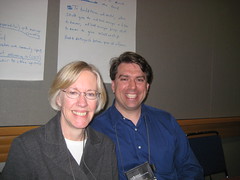I don't like lugging laptops to conference so I thought that I would try to rely on my Blackberry, iPod Touch, and Sony Reader. I made a big mistake on the last device; I forgot the power cord for my Reader. There I was foolishly reading my book while listening to music on my Reader (so that I could conserve power on my other devices). Of course this drains the battery like nobody's business. I also brought a digital camera, not thinking about how I would upload those pictures. Luckily the hotel had a business center and I was able to upload pics just fine.
I tried Foursquare with my Twitter account. I felt Foursquare was valuable for the conference, but doubt that I will use it outside of that. Foursquare is a good tool if you already know people and are in close proximity, fostering social connections, especially at a professional conference in a new city. It was a great tool to see who was around and I got to meet people in real life that I only knew on Twitter. I geeked out a bit and put my Twitter handle and picture on my badge as well. It was helpful and fun to associate a photo with the Twitter persona.
Overall, I would say the mobile conferencing was a success.
Sunday, March 28, 2010
Saturday, March 27, 2010
Changing Course: Leadership for Navigating the New Library
With Luis Herrera, San Francisco Public Library Director
With Susan Hildreth, Seattle Public Library Director
This was a wonderful program that I had the privilege to attend. There were many of my library management heroes there like Susan Hildreth (Seattle), Luis Herrera (San Francisco), and a good friend, Laura Isenstein with Providence Associates. I met some new friends there, some from Twitter, and other brilliant library admin people.
We had homework for this program, four articles that are available online. These are classics in the management profession, one of them by Peter Drucker. I will post the links to my Delicious account.
This session was held over two days during the pre-conference. The main focus was to understand the basic principles of the articles; the community building and building personal networks were the high points for me.
The thing that puzzled me a little is that I feel like I have gone down this road before. I used the Planning for Results model sponsored by PLA. However, even though many libraries went through the strategic planning process, many didn't engage the community in a meaningful way. They grabbed the same people that were already in their circle and asked them what they already knew. As the presenter told me, they didn't expand their sandbox or their social circle, thereby they didn't gather meaningful support. I even discussed a very prominent library and wondered surely they did this, and in fact they didn't. They got complacent.
I can't tell you how meaningful those relationships in the community are. You don't have to be a director to make them. In fact, my library has several staff members who are so embedded. It's amazing what they can accomplish, how "in the know" they are. They are valued and consulted, particularly on non-library issues. This is a big part of what we are talking about. Do you have the relationships that move beyond library and into community? Are you at that point? Great takeaways!
Another concept discussed was the personal board of directors concept- trying to establish a network of coaches and mentors that you can speak freely with and that can guide you in any aspect of your life. This is a circle that will inoculate your decision-making so that the first person telling you an idea is stupid isn't a staff member or a board member. Another point of emphasis is to not limit this circle just to librarians. I would think non-librarians would be particularly valuable, as you don't get too tunnel visioned. Library organizational issues are almost never unique to libraries, and we shouldn't treat them as such.
Overall, it was a great program. Our moderator understands our profession needs to change and to accomplish that he needed to change the people in the room, a tough sell. I think we can change and be the center, the Mecca of our communities. Surprisingly, it only takes one phone call.
- Posted using BlogPress from my iPhone
Thursday, March 25, 2010
The post where I gush about PLA and other thoughts

I can't tell you how impressed that I am with the 2010 Public Library Association Conference. This conference just did everything right. Beautiful location, beautiful venue, free working wireless and world class presenters. They even got the weather to cooperate! Sunny days in Portland in MARCH, someone must have good connections.
Having Natalie Merchant at the program was huge! Playing stuff yet to be released and having her serenade librarians with a thank you and going into the audience! Wow, that's what librarians need right now. The conference started a bit melancholy for me as I knew many colleagues were suddenly pulled from coming and many more would shortly be laid off. In fact I got news of a friend who was to be laid off, just as the program was starting. I hope that I can make a connection for her, but I couldn't help thinking of others. Like soldiers falling in the line, we must move forward but it's hard not to mourn what's going on, I can barely read the news anymore.
In sharp contrast, Kristoff gave us a lot to be thankful for. If you've read Half the Sky you know about the oppression of women worldwide. Women not considered worthy enough to save their lives, pay for an education, or even to pay for a simple surgery that could improve their quality of life. The book resonated with me, but not in the specific way of women in third world countries. What makes the book different was that it breaks down the problem, offers a solution, then goes further in discussing how good deeds and relief can be fruitless and difficult. Sometimes solving the problem doesn't end at one stage in the effort, but must be seen through. He told the story of a woman kidnapped and sold into sexual slavery. To save this woman, he purchased her and brought her back to her village. However, in one week she ran back to the brothel because she was addicted to meth that only the brothel could supply. How to solve that problem?
It reminded me of our library's literacy efforts. Literacy is only the first step. They then need a GED, job skills, soft job skills, then afterward to find a job, but then there aren't any. It's a great deal of work, and rewarding, but the work doesn't stop at literacy. The problems are much bigger and multifaceted. It's not just literacy, it's getting teens out of gangs and into the library. It's so much more. This is the work libraries need to do.
At the end of the day I'm energized and thankful about the work I can do in my community. I run an organization that is unique in one particular way. Other community agencies, schools and nonprofits have specific goals, mandates, and parameters that restrict them from doing the most good; libraries aren't as restricted. I can get on a committee and say we can give resources, know how to get funding, and can bridge the gap on your mandate. It's a wonderful feeling, like being a superhero and that's how this conference made me feel, thank you PLA!

- Posted using BlogPress from my iPhone
Subscribe to:
Comments (Atom)


